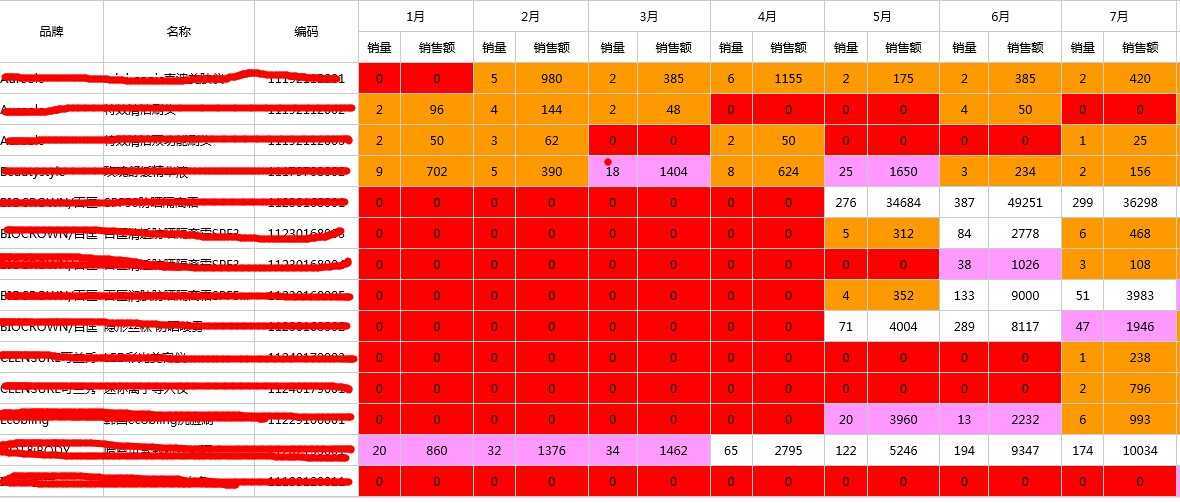标签:blog http io ar 数据 sp 2014 art on
关于sql 分组统计查询,我们在做报表的时候经常需要用到;今天就在这里整理下;
先附上一段sql代码:
if object_id(N‘#mytb‘,N‘U‘) is not null drop table #mytb
go
declare @Year int
set @Year=2014
create table #mytb ([Date] int,[Count] int,[Price] decimal(18, 0),[spbm] varchar(50),[sppp] varchar(100),[spmc] varchar(500))
insert #mytb
select *from
(
select
m as [Date],
sum(
case when datepart(month,c.addtime)=m
then ordernum else 0 end
) as [Count] ,
sum(
case when datepart(month,c.addtime)=m
then ordernum*orderPrice else 0 end
) as Price,
c.spbm,
s.sppp,
s.spmc
from
TB_CusorderDetail c left join TB_SPXX s on c.spbm=s.spbm,
(
select 1 m
union all select 2
union all select 3
union all select 4
union all select 5
union all select 6
union all select 7
union all select 8
union all select 9
union all select 10
union all select 11
union all select 12
) aa
where
@Year=year(c.addtime)
and c.delstatus=0 and c.spbm in (SELECT spbm FROM TB_SPXX WHERE delstatus=0 AND isupinfo=1 AND spbm LIKE ‘1%‘ AND LEN(SPBM)>7)
group by
m,c.spbm,s.sppp,s.spmc
)z
select sppp,spmc,spbm,
max(case [Date] when 1 then [Count] else 0 end) ‘一月份总量‘,
max(case [Date] when 1 then [Price] else 0 end) ‘一月份总额‘,
max(case [Date] when 2 then [Count] else 0 end) ‘二月份总量‘,
max(case [Date] when 2 then [Price] else 0 end) ‘二月份总额‘,
max(case [Date] when 3 then [Count] else 0 end) ‘三月份总量‘,
max(case [Date] when 3 then [Price] else 0 end) ‘三月份总额‘,
max(case [Date] when 4 then [Count] else 0 end) ‘四月份总量‘,
max(case [Date] when 4 then [Price] else 0 end) ‘四月份总额‘,
max(case [Date] when 5 then [Count] else 0 end) ‘五月份总量‘,
max(case [Date] when 5 then [Price] else 0 end) ‘五月份总额‘,
max(case [Date] when 6 then [Count] else 0 end) ‘六月份总量‘,
max(case [Date] when 6 then [Price] else 0 end) ‘六月份总额‘,
max(case [Date] when 7 then [Count] else 0 end) ‘七月份总量‘,
max(case [Date] when 7 then [Price] else 0 end) ‘七月份总额‘,
max(case [Date] when 8 then [Count] else 0 end) ‘八月份总量‘,
max(case [Date] when 8 then [Price] else 0 end) ‘八月份总额‘
from #mytb
group by sppp,spmc,spbm
关于这段sql代码,剖析如下:
1:新建一个临时表#mytb
create table #mytb ([Date] int,[Count] int,[Price] decimal(18, 0),[spbm] varchar(50),[sppp] varchar(100),[spmc] varchar(500))
2:分组查询12个月份数据
select *from
(
select
m as [Date],
sum(
case when datepart(month,c.addtime)=m
then ordernum else 0 end
) as [Count] ,
sum(
case when datepart(month,c.addtime)=m
then ordernum*orderPrice else 0 end
) as Price,
c.spbm,
s.sppp,
s.spmc
from
TB_CusorderDetail c left join TB_SPXX s on c.spbm=s.spbm,
(
select 1 m
union all select 2
union all select 3
union all select 4
union all select 5
union all select 6
union all select 7
union all select 8
union all select 9
union all select 10
union all select 11
union all select 12
) aa
where
@Year=year(c.addtime)
and c.delstatus=0 and c.spbm in (SELECT spbm FROM TB_SPXX WHERE delstatus=0 AND isupinfo=1 AND spbm LIKE ‘1%‘ AND LEN(SPBM)>7)
group by
m,c.spbm,s.sppp,s.spmc
)z
这段sql主要根据年份查询当年12个月份售出的产品统计;
3:横纵坐标转换
把分组查询出来的数据插入到临时表中后
select sppp,spmc,spbm,
max(case [Date] when 1 then [Count] else 0 end) ‘一月份总量‘,
max(case [Date] when 1 then [Price] else 0 end) ‘一月份总额‘,
max(case [Date] when 2 then [Count] else 0 end) ‘二月份总量‘,
max(case [Date] when 2 then [Price] else 0 end) ‘二月份总额‘,
max(case [Date] when 3 then [Count] else 0 end) ‘三月份总量‘,
max(case [Date] when 3 then [Price] else 0 end) ‘三月份总额‘,
max(case [Date] when 4 then [Count] else 0 end) ‘四月份总量‘,
max(case [Date] when 4 then [Price] else 0 end) ‘四月份总额‘,
max(case [Date] when 5 then [Count] else 0 end) ‘五月份总量‘,
max(case [Date] when 5 then [Price] else 0 end) ‘五月份总额‘,
max(case [Date] when 6 then [Count] else 0 end) ‘六月份总量‘,
max(case [Date] when 6 then [Price] else 0 end) ‘六月份总额‘,
max(case [Date] when 7 then [Count] else 0 end) ‘七月份总量‘,
max(case [Date] when 7 then [Price] else 0 end) ‘七月份总额‘,
max(case [Date] when 8 then [Count] else 0 end) ‘八月份总量‘,
max(case [Date] when 8 then [Price] else 0 end) ‘八月份总额‘
from #mytb
group by sppp,spmc,spbm;
利用日期昨晚扭转横纵坐标;
最后附上一图,体现最终结果

标签:blog http io ar 数据 sp 2014 art on
原文地址:http://www.cnblogs.com/panshengqiang/p/3996087.html